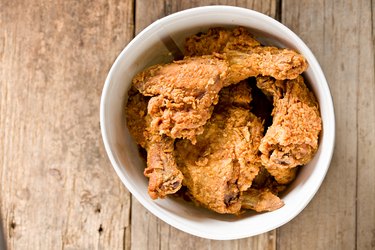
More than 1.5 billion chicken wings are consumed in the days and weeks leading up to Super Bowl Sunday. If you want to partake in this tasty party treat, you'll also want to know more about chicken wings' nutrition.
Chicken is a high-quality protein, but fried versions come with added fat and calories. An occasional indulgence in wings is fine — but avoid making them a regular part of your diet.
Video of the Day
Video of the Day
Tip
The average fried chicken wing contains between 42 and 159 calories, 6 to 10 grams of protein, and 2 to 11 grams of fat. How the wing is fried makes a difference in its nutritional value.
Chicken Wings Nutrition
Chicken wings nutrition varies greatly depending on preparation. Frying chicken adds serious calories, fat and carbohydrates if it's done with breading or flour. But, if you eat just the meat from a fried chicken wing, the nutrition profile is about the same as that of a roasted chicken wing.
In the meat part of a roasted or fried chicken wing — about 20 grams worth — you get 42 calories, 6 grams of protein, 2 grams of fat and no carbohydrates. Eating the skin along with the meat adds 25 to 30 percent more calories, notes Food and Nutrition Research in a paper published in June, 2015.
Read more: General Nutritional Facts About Chicken
Dredge your chicken wing in flour or batter prior to frying, and the chicken wings' nutrition profile changes. A battered chicken wing contains 159 calories, 9.75 grams of protein, almost 11 grams of fat and 5 grams of carbohydrates. A chicken wing doused in flour before frying contains 103 calories, 8 grams of protein, 7 grams of fat and 0.76 grams of carbohydrates.
The exact nutrition breakdown and chicken wing calories ultimately depends on the particular recipe used to fry the wings.
High-Quality Chicken Macronutrients
Chicken is known as a high-quality protein, meaning it contains all the essential amino acids, in the right ratios, that your body needs for optimal health. As explained in the Food and Nutrition article, a sufficient intake of protein is about 0.83 grams of protein, per kilogram of body weight, per day —or 0.37 grams per pound of body weight. This guideline is applicable to about 97.5 percent of healthy people.
The protein in chicken wings contributes to this recommended protein intake. Chicken protein also has a low level of collagen, a major compound that gives protein structure. This helps make chicken more digestible than proteins with a higher collagen content.
Read more: 15 of the Best Lean Animal Proteins
Chicken wings are a fattier part of the bird, but chicken fat has a favorable composition. As explained by the Food and Nutrition research paper, chicken fat includes notable amounts of monounsaturated fatty acids, especially when compared to pork or beef, as well as substantial amounts of polyunsaturated fats, most of which are found in the skin. Of course, the fat in fried chicken wings also comes from the batter and the oil in which it's fried. These sources of fat may not be as favorable.
Chicken is fed with a vegetable-derived feed by most farmers, which helps their meat contain many long-chain omega-3 fatty acids. These fatty acids fight inflammation, and promote brain health. Americans don't always eat enough fatty fish, a prime source of these fatty acids, so chicken fat can be a good addition to their diet.
Chicken wings also serve as an important source of niacin, a B vitamin, and iron. While you can get these nutrients from leaner cuts, such as the breast, chicken wings aren't a nutritional zero. An alternative for healthier wings? Roast them at a high heat after coating in a flavorful marinade.
- USDA Nutrient Database: "Chicken, Broilers or Fryers, Wing, Meat and Skin, Cooked,Fried, Batter"
- USDA Nutrient Database: "Chicken, Broilers or Fryers, Wing, Meat and Skin, Cooked, Fried, flour"
- USDA Nutrient Database: "Chicken, Broilers or Fryers, Wing, Meat Only, Cooked, Fried"
- Vox: "America’s Love Affair With the Chicken Wing, Explained"
- USDA Nutrient Database: "Chicken, Broilers or Fryers, Wing, Meat Only, Cooked, Roasted"
- Food and Nutrition Research: "Role of Poultry Meat in a Balanced Diet Aimed at Maintaining Health and Wellbeing: An Italian Consensus Document"